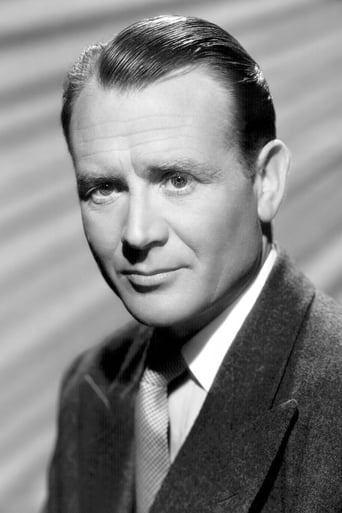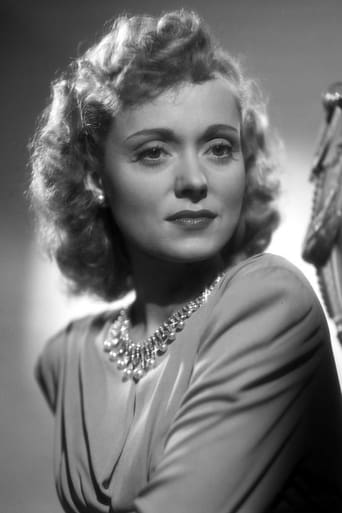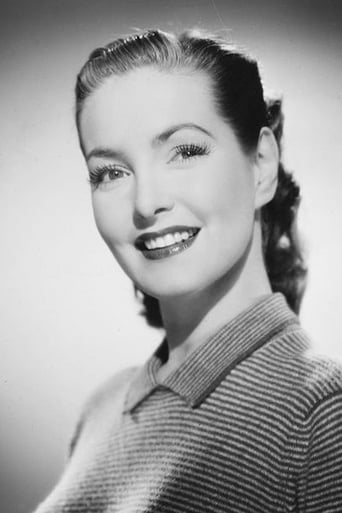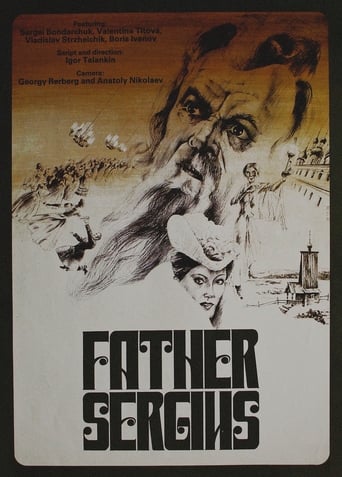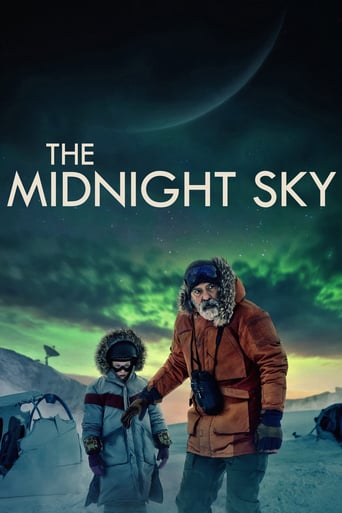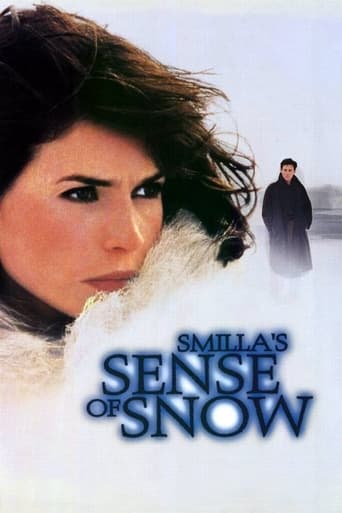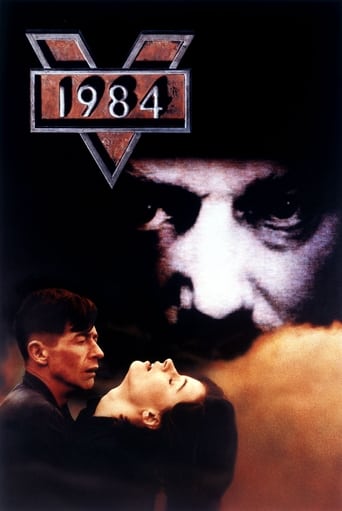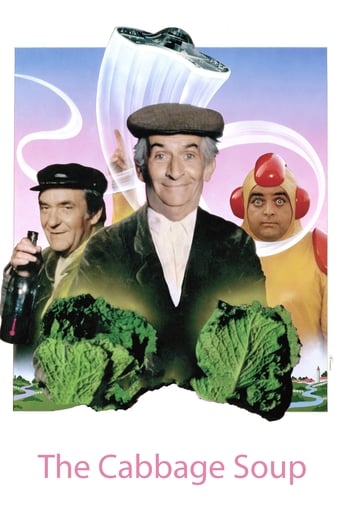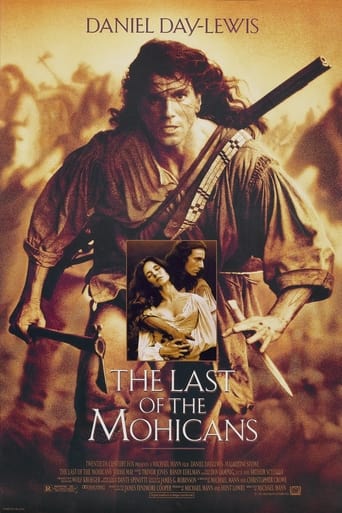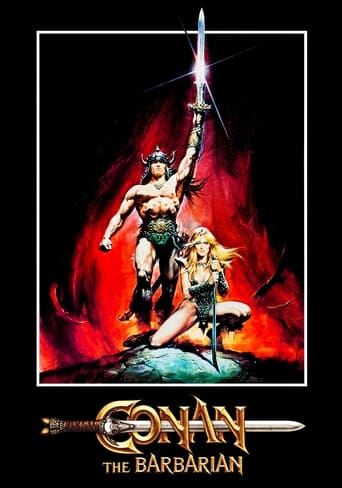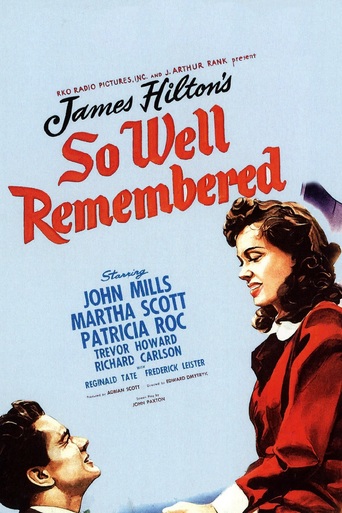
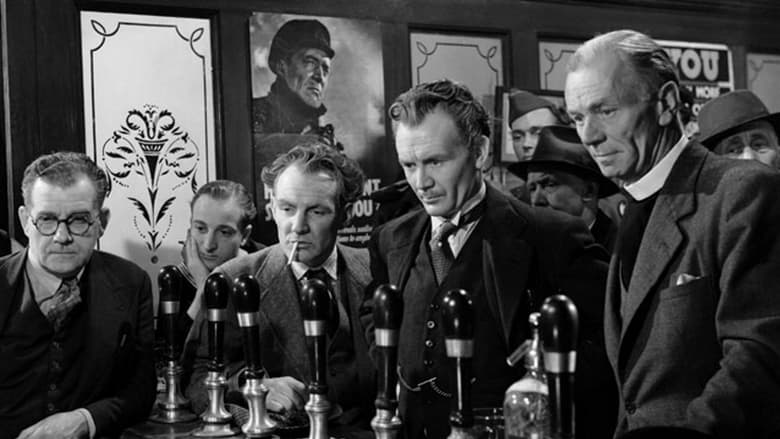
So Well Remembered (1947)
A mill-owner's ambitious daughter almost ruins her husband's political career.
Watch Trailer
Cast


Similar titles
Reviews
Good concept, poorly executed.
This movie was so-so. It had it's moments, but wasn't the greatest.
This is one of the few movies I've ever seen where the whole audience broke into spontaneous, loud applause a third of the way in.
The thing I enjoyed most about the film is the fact that it doesn't shy away from being a super-sized-cliche;
This is an oddity among James Hilton's novels, the closest he got to a social and Dickensian novel with perhaps the only crook he ever produced, and she is more stealthily disguised as such than any villain in Shakespeare or Dickens. This is a psychological drama charting the psyche of a very dangerous woman - she is born rich and powerful and can never do without that as a kind of birthright, and when she is thwarted she is destroyed. Until she is thwarted she destroys all her men including her children.This is a thriller in disguise. James Hilton was the most gentlemanly author in England's 20'th century together with John Galsworthy, and also this Bleak House drama is told very suavely with a gentleman's kind politeness all the way. You have to love Olivia Channing as much as John Mills does, until he has to face the facts when almost everything is too late.To see this novel realized on screen I experienced as a miracle. I knew it existed and searched for it for years, and suddenly it was there - with even James Hilton himself as speaker, with his gentle and perfectly clear Cambridge diction. I always enjoyed James Hilton almost more than any other English author of that century for his always musical language, which even that is fully realized in the film.A few years later Edward Dmytryk, exiled from Hollywood, made his masterpiece "Give Us This Day" about Italian immigrant workers in New York 1929 completely filmed in London (with New York recreated in studios), another important milestone of social realism (see my review). This is less dramatic and pathetic and tells a less upsetting story but is instead more convincing. Trevor Howard had just made his "Brief Encounter" perfect gentleman of a doctor, while he here is hard on the bottle from the beginning to end, although John Mills after twenty years only has to carry him home from the pub twice a week.Martha Scott finally is perfect as Olivia, beautiful, charming and mysterious, giving from the beginning quite a good impression of herself as a beauty of mysteries that could be dangerous not only for your peace of mind.
What an interesting film in a number of ways. Author James Hilton narrated! It was filmed in location in England, giving the viewer a really good sense of what England looked like at the end of WWII. And, the film disappeared and was thought lost until 2004 when a full print (in good condition) was found in Tennessee! The opening of the film is put in a very nice historical perspective with some interesting photography.As WWII closes, the mayor, newspaper editor, and reformer (John Mills) looks back on his years of knowing, marrying, and divorcing Martha Scott. It begins with him defending her when she applies for the job of assistant library job; many won't consider it because her father had owned the huge mill works there and had gone to prison for years for speculating with the money of the locals. Soon, however, Mills falls in love with her and proposes on the very night that her father is killed when he is being driven into town by the local doctor (Trevor Howard) and the washed-out road reaches out and drags the car down into the river during a heavy storm (keep that in mind). Olivia then agrees to marry George.Once married, Scott pushes her husband to run for Parliament, but an epidemic of diphtheria in the town's filthy slums sidelines him...and takes their own son's life when mother fails to have him inoculated in a mere public clinic. Scott ends the marriage, remarries to a rich man and has another son, (Richard Carlson), who is badly scarred in the war. In the hospital, his mother latches on to him in a predatory way, at first stymieing a relationship between the son and the foster daughter of the village doctor. Meanwhile, Scott has returned to the family mansion and reopened the dangerous and dilapidated mill. Mills intervenes and helps the young couple marry, and only then learns that Scott knew the road had washed out and that her father was likely to be killed using the road, but intentionally did not warn him...thus, murder.And that last factor is the only part of the movie which I felt was handled poorly. Yes, the viewer knew that Scott had just used the road, but it could have washed out after she used it, and so (at least to me) it came as a bit too much of a plot twist, which could have been resolved by simply giving us a couple of clues.John Mills is excellent here. His co-star, Martha Scott is, as well, but the role of such a controlling, domineering, ...well, you know the word, leveled her to being totally unlikable in this film. In a sense, a rather courageous choice of a role to take. For the first part of the film I kept thinking what a good role this would have been for Greer Garson, but of course, Garson would have never taken a role that was so totally unlikable. Richard Carlson plays the injured son perfectly. Trevor Howard had the only role (of the doctor), which I felt was NOT played well. One of the best performances, though the character's death early in the film made it short, was that of Frederick Leister as Scott's father, who played a broken man after his many years in prison.Oh, and BTW, this is one of those films where the leading man slaps the leading lady...twice...and deservedly so, although when the scene where it happens begins, the viewer will assume it will be the other way around.This is an excellent film...and I say that as a person who is not very fond of British cinema.
I bought this film on eBay.co.uk and its cover revealed it is distributed by "Onyx Media International" under the banner of "2 Classic British Movies", the other being "The Rakes Progress" with Rex Harrison, Lilli Palmer, Griffith Jones & Jean Kent.But to "So Well Remembered", like other reviewers I was mildly surprised that I had not heard of this film until now, especially as I am a connoisseur of 1940s films.In 1947 Britain was almost bankrupted by the second world war and only managed to repay its war debt in 2006.For this reason producers who wanted higher production values sometimes had to compromise on cast and market films like this to the U.S.(our biggest creditor), which had the money, to market to American audiences.For this reason and despite a plethora of British acting talent available at the time, they cast Martha Scott (born in Missouri) to play the Cheshire born wife Olivia of John Mills (George Boswell).It is hard enough for even English actresses to get the Lancastrian/Cheshire intonation right and in "Coronation Street" the long running (50 years!) British soap, they tend to cast authentic Lancashire born actresses for the sake of social realism.By the same token casting Richard Carlson as Charles Winslow, I found his American speech patterns destroyed what should have been a realistic story set in a grim northern English setting.Those two actors (not their fault just circumstances) completely destroyed the illusion, making the story seem almost surreal.Another reviewer points out that the fictitious town of "Browdley" was actually shot on location in Macclesfield, now considered an affluent enclave of Cheshire (which borders Lancashire).It is where rich Lancastrians tend to gravitate e.g. premiership footballers.I was pleased to see Patricia Roc (Julie Morgan) and Trevor Howard (Dr.Richard Whiteside) who gave top support billing to Mills & Scott.Also the ever reliable Beatrice Varley (Annie) whose favourite role of mine was as "Aunt Prowd" in "Gone to Earth" (1949).Even the minor actors got my attention, there was Roddy Hughes ("Quiet Wedding" 1941 and "A Girl Must Live" 1939") and Ivor Barnard popping up playing "Spivey" the type setter.Ivor appeared most notably in David Lean's "Great Expectations"(1946) playing "Wemmick" who was "Jaggers" clerk, again with John Mills as Pip.There was a social message in the film which portrayed the abject poverty and disease prevalent amongst the poor between the two world wars.Major improvements to housing and health were urgently required and the pacifist British Governments of the 20s & 30s put this as paramount in their social order (but ignored the threat from Germany).I marked this film 6/10.
This is a wonderful little film about an extremely decent man who puts himself on the line to defend a family against the anger of a small village. However, what makes it interesting is NOT this confrontation between the good man and the prejudiced town,...this is only the beginning of the plot. He marries the daughter of the most hated man in town and the average viewer will probably THINK they know where the film is heading--and it takes a sharp turn in another direction. It turns out that there might be something to this hatred by the town, as the new bride slowly reveals herself to be an evil harpy who is hell-bent on revenge upon the townspeople.Excellent acting, direction, writing and the MGM polish make this a film well-worth your time.


